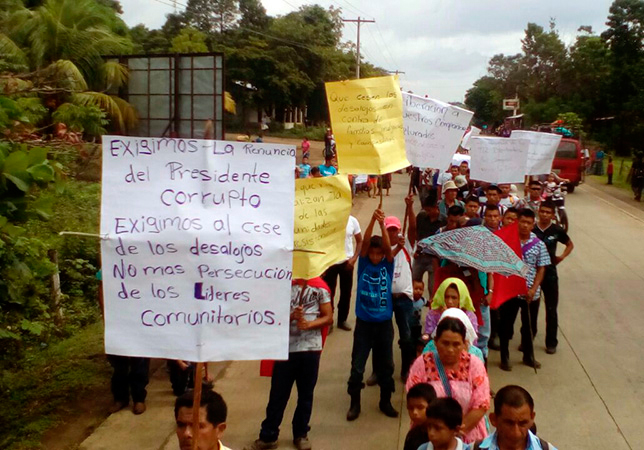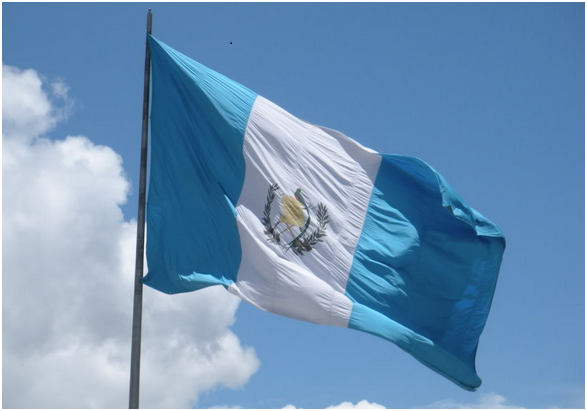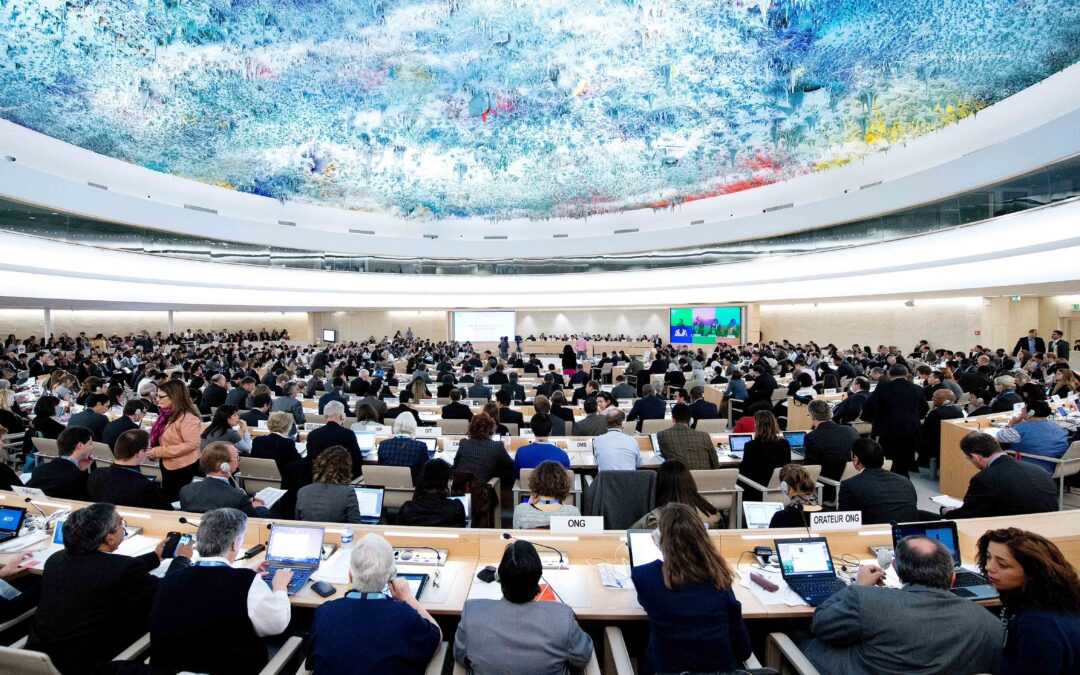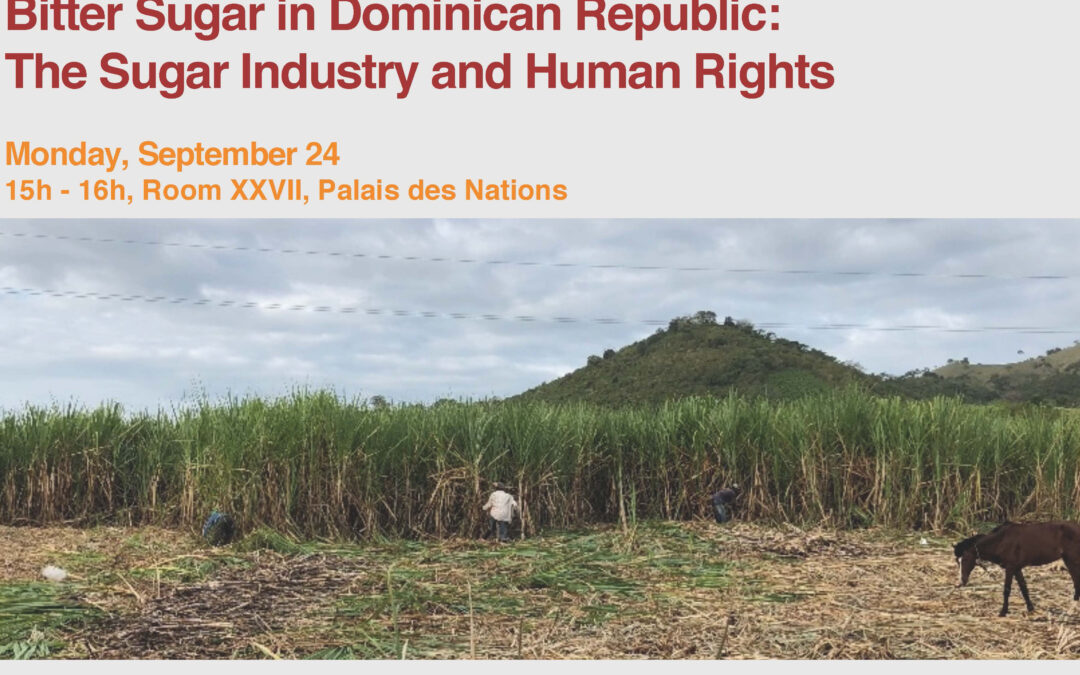
Nov 30, 2018 | Events
The conference on business and human rights in the Department of Izabal, Guatemala was held at the University of Geneva on 29 November 2018 and co-hosted with the Department of Public International Law and International Organization, Faculty of Law of the University of Geneva and the City of Geneva.
The main issue under review was the impact on the local communities of the operations of the Compañia Guatemalteca de Nickel (CGN-ProNico) a nickel mining company in El Estor, wholly owned by Solway Investment Group, a company registered in Zug, Switzerland.
Speaking at the conference, Prof. Marco Sassòli, a Commissioner of the International Commission of Jurists (ICJ), recommended there be an international mission to Izabal, Guatemala in order to understand the problems facing the local Q’eqchis communities as a result of the Solway nickel mining operations.
Other speakers included Ramon Cadena, the Director of the ICJ Central America office, Amalia Caal Coc, from the Guillermo Torielo Foundation in Izabal, Guatemala, Maynor Alvarez, the manager of the CGN Community Affairs Department, and Sandra Epal Ratjen, Deputb Executive Director at Franciscans International.
Dr Antonella Angelini from the Department of Public International Law and an expert in business and human rights was the conference moderator.
A more detailed account of the conference proceedings is available (download).

Nov 28, 2018 | Events, News
A conference on the situation of business and human rights in Izabal, Guatemala will be held on 29 November 2018 at UNIMAIL University of Geneva at 6:30 pm.
THIS CONFERENCE IS IN FRENCH AND SPANISH ONLY
The conference is co-organised by the International Commission of Jurists, the Department of International Public Law and International Organisation, Faculty of Law, University of Geneva and the Town of Geneva.
Speakers at the conference include Ramon Cadena, the Director of the ICJ Central America Office, Amalia Caal Coc, a local community leader from the Guilermo Torielo Foundation, Maynor Alvarez, Director of Community Relations from the Guatemalan Nickel Company, Solway Group, and Sandra Ratjen, Franciscans International. The panel moderator is Dr Antonella Angelini from the Department of International Public Law and International Organisation.
The meeting room is R070 at UNIMAIL, There will be a discussion after the panel. Entrance is free and there will be interpretation in French and Spanish.
Flyer in Spanish (PDF)
Flyer in French (PDF)

Oct 23, 2018 | Events, News
This side event will be held on October 25th, 2018, from 13:00 until 14:30 at Room XXVII, Palais des Nations, United Nations, in Geneva.
Organized jointly by the ICJ, the International Institute for Sustainable Development (IISD) and the Friedrich Ebert Stiftung (FES), this session’s goal is to provide a platform for discussion about the benefits and shortcomings of the current model of dispute settlement on investment matters and the needs and directions of future reform.
The debate will assist all participants in the World Investment Forum in understanding the current issues regarding investment dispute settlement and the needs and options for reform with a view to foster a strategy where investment-related dispute settlement and rule of law principles contribute to the sustainable development objectives.
The objectives of the event:
- Provide a platform for informed discussion among practitioners and interested stakeholders in the area of investment-related dispute settlement
- Contribute to an improved understanding of the issues at stake and the options for future reform
- Contribute to the efforts of the international community to achieve common ground in various issues related to investment-related dispute settlement
Issues for debate:
- What should governments expect from the ongoing UNCITRAL process in reforming investor-State dispute settlement (ISDS)?
- Should substantive and procedural issues relating to the current model of dispute settlement on investment matters be addressed in a comprehensive way?
- What are the elements to be considered when discussing the possible creation of an investment court?
- Would people impacted by investment projects have a role and standing in investment-related dispute settlement?
Speakers:
Vu Thi Chau Quynh, Deputy Director General, Department of Legislation, The Ministry of Planning and Investment, Viet Nam
Kekeletso Mashigo, Director, Legal – International Trade, Investment, Tax Trade Negotiations Unit, International Trade and Economic Development Division, Department of Trade and Industry, South Africa
Colin Brown, Deputy Head of Unit – Dispute Settlement and Legal Aspects of Trade Policy – DG TRADE – European Commission
Samira Sulejmanovic, Head, Unit for Bilateral Trade Relations, Ministry of Foreign Trade and Economic Relations, Bosnia and Herzegovina
Jane Kelsey, Professor, Faculty of Law, The University of Auckland, New Zealand
Moderator:
Sam Zarifi, Secretary-General of the ICJ.

Oct 19, 2018 | Advocacy, Non-legal submissions
The International Commission of Jurists participated in the fourth session of the open-ended intergovernmental working group on transnational corporations and other business enterprises with respect to human rights that took place at the Palais de Nations from 15-18 October 2018. Below are the interventions the ICJ made at this session.
UN-ICJ statement IGWG4 general debate-Advocacy-ENG-2018
UN-ICJ statement IGWG4 prevention-Advocacy-ENG-2018
UN-ICJ statement IGWG4 legal liability-Advocacy-ENG-2018

Sep 19, 2018 | Eventos, Noticias
La CIJ acogerá el evento paralelo, “Azúcar amargo en la República Dominicana: la industria azucarera y los derechos humanos” el lunes, 24 septiembre 2018 de 15:00-16:00 habitación XXVII, en el Palais de Nations en Ginebra.
Junto con el turismo, la producción de azúcar es una de las principales industrias y una de las mayores fuentes de empleo en la República Dominicana.
Este pequeño estado caribeño sigue siendo uno de los principales proveedores mundiales de azúcar en los Estados Unidos.
Si bien la producción y exportación de azúcar en la República Dominicana son unas fuentes importantes de ingresos para el país, los impactos adversos de su producción son varios.
La destrucción del medio ambiente, el acceso reducido a la tierra para las comunidades locales, los desalojos forzosos y las condiciones laborales precarias en las plantaciones de caña de azúcar son lamentablemente una realidad en muchas regiones del estado caribeño.
Mientras que la República Dominicana ha demostrado en los últimos años estar preparada para cumplir y aplicar las normas internacionales sobre asuntos relacionados con las empresas y los derechos humanos, el país sigue enfrentando muchos desafíos y las evidencias de violaciones de derechos humanos proviniendo del terreno todavía pintan una realidad complicada.
Dos ejemplos recientes involucrando la industria de la caña de azúcar ilustran la preocupación constante por los abusos contra los derechos humanos en la República Dominicana.
En 2016, agentes armados de uno de los mayores productores de azúcar del país, Central Romana Corp., expulsaron por la fuerza de sus hogares a más de 60 familias durante la noche.
No se han proporcionado alojamiento alternativo o reparaciones a las víctimas para reparar la destrucción de sus hogares y el trauma causado por la violencia de los desalojos.
En 2017, el Grupo Vicini, la segunda principal empresa productora de azúcar del país, utilizó el pesticida glifosato de tal manera que muchas personas corrieron peligro de muerte y que destruyó los cultivos y el ganado de los campesinos. Hasta la fecha, las violaciones de los derechos humanos en ambos casos siguen impunes.
Existe una creciente preocupación internacional de que la industria de la caña de azúcar en la República Dominicana puede de alguna manera actuar con impunidad cuando se trata de violaciones de derechos humanos.
Teniendo en cuenta el próximo Examen Periódico Universal de la República Dominicana, en el cual todos los Estados Miembros de la ONU examinarán la situación de los derechos humanos en el país, este evento paralelo tiene como objetivo informar y arrojar luz sobre esta realidad poco conocida en la República Dominicana e informar a las delegaciones estatales sobre la importancia de abordar este tema en su revisión de la República Dominicana.
El evento también proporcionará un espacio para el diálogo constructivo entre varios actores, incluido el Gobierno de la República Dominicana.
Panelistas:
– Un experto sobre el tema de las empresas y los derechos humanos (Carlos Lopez, Comisión Internacional de Juristas)
– Un experto sobre el tema de la industria azucarera en la República Dominicana y sus impactos sobre los derechos humanos (Fr. Damián Calvo Martin OP, Centro de Teología Santo Domingo de Guzman)
– Una víctima de desalojos forzosos por parte de Central Romana Corp. (María Magdalena Álvarez Gálvez)
Moderador: Rory Gogarty, High Court of England and Wales
Interpretación: se proporcionará de inglés a español y de español a inglés
República Dominicana evento 24 septiembre (volante de evento en PDF)









